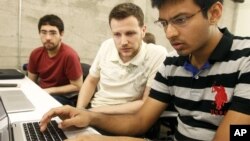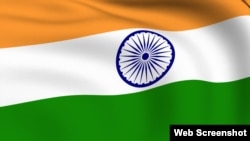Student Union
Fewer New Foreign Students Coming to America

While more than 1 million internationals study in the U.S. for college and university, the rate at which they are arriving is slower, with a decline shown among new foreign students coming here.
The annual Open Doors report released Monday shows that the rapid rise of international students -- mostly from China and India -- over the past decade stalled in 2016-2017. Enrollment figures show about 10,000 fewer new students came to the U.S. this year over last.
This is the first time the number of new enrollments has declined in six years.
“The factors driving the decline are a mix of global and local economic conditions,” said Allan Goodman, president of the International Institute for Education (IIE), which compiles the data with the U.S. State Department’s Bureau of Educational and Cultural Affairs, such as declines in students coming from Saudi Arabia and Brazil.
Because of cutbacks in overseas government programs that fund scholarship in the U.S., Saudi enrollment in U.S. schools declined 14 percent. Brazil showed a 32 percent decline in the amount of students it sends here.
The cost of college in the U.S. and increased competition from universities and programs in other nations has dampened the attractiveness of higher education in the U.S., IIE reported.
“What we’re hearing for the first time is ‘Ouch!’ from families,” Goodman said. “Our costs have risen to the point where our students are looking for alternatives.”
Schools in Germany, France, China and Japan, among others, are setting up programs taught in English, said Peggy Blumenthal, IIE’s chief counselor to Goodman. Some of those programs are far less expensive than tuition and fees in the U.S., she said.
“Countries and multinational employers around the world are competing to attract top talent. As more countries become active hosts of international students and implement national strategies to attract them, the competition … will only intensify,” Goodman said.
Other factors dissuading internationals from coming to America? Safety and security for their children, and the existing political climate, experts said.
Increasing conflicts on U.S. campuses gives parents and grandparents pause before sending their young family members to America, said Rajika Bhandari, head of research, police and practice at IIE.
Incidents have made global news about fatalities and hurt in college towns, such as in Charlottesville, Virginia, where white supremacists clashed with opponents near the University of Virginia. One women and two male law enforcement officers were killed this summer in protests.
In the Midwest, a Chinese student abducted at the University of Illinois is presumed dead. Most recently, a Chinese student was killed in a car-jacking near the University of Utah. Two Indian immigrants who came to the U.S. as international students, were shot in Kansas as they enjoyed a drink after work. One died, and the news was widely reported in India.
Those incidents have dove-tailed with President Donald Trump’s call for less immigration, specifically from Muslim-majority nations. Some students have expressed fear that their visas could be nullified, leaving them with incomplete degree programs in the U.S.
However, none of the 10 top countries that account for the overwhelming number of foreign enrollment are included in current visa restrictions.
China and India continue to send the most students: China sent 350,000 (nearly 7 percent increase), and India, 186,000 (more than 12 percent more than the previous year). Nepalese enrollment increased to more than 11,000 studying in the U.S. (20 percent upward shift); Vietnamese more than 22,400 (nearly 5 percent more than the past year).
Iranian enrollment increased to 12,600 students (3 percent increase) in U.S. schools, while Nigeria -- which sends the most African students to U.S. institutions -- had 11,700 students here, a nearly 10 percent increase.
Bangladesh sent more than 7,000 students to the U.S. in the past academic year, an increase of 9.7 percent.
Mexico is ninth in the list of countries that send students to the U.S., with nearly 17,000 in programs. That was a 0.6 percent increase over the past school year. Canada is No. 5, sending 27,000 students to the southern side of North America.
The No. 1 major for international students is engineering, business and management, math and computer science (which increased 18 percent), social sciences, physical and life sciences, fine and applied arts, health professions. Studies in Intensive English declined nearly 26 percent, with education declining more than 7 percent.
The number of international students in the U.S. are staying longer to participate in Optional Practical Training (OPT), a visa program that allows them to train in their field after their degree is complete.
IIE also conducts what they call a “snapshot” of trends for the current school year, 2017-2018. The nearly 500 colleges and universities say they see the same flattening in number of students and decline of about 7 percent in new students.
International students add about $39.4 billion to the U.S. economy through tuition, room and board and living expenses, according to the U.S. Department of Commerce. Sixty percent of international students pay for their U.S. education through personal family funds.
The universities with the largest populations of international students are New York University, University of Southern California, Columbia University, Northeastern University, Arizona State University, University of Illinois-Urbana Champaign, University of California-Los Angeles, Purdue University, University of Texas-Dallas, Pennsylvania State University.
The states where most international students attend programs are California, New York, Texas, Massachusetts, Illinois, Pennsylvania, Florida, Ohio, Michigan and Indiana.
The survey is conducted by IIE with the American Association of Collegiate Registrars and Admissions Officers (AACRAO), American Association of Community Colleges (AACC), American Association of State Colleges and Universities (AASCU), American Council on Education (ACE), Association of Public and Land Grant Universities (APLU), College Board, Council on Graduate Schools (CGS), National Association for College Admissions Counseling (NACAC), and the Association of International Educators (NAFSA).
Please share your suggestion in the Comments here, and visit us on Facebook, Twitter, Instagram, and LinkedIn, thanks!
See all News Updates of the Day
- By VOA News
Competition grows for international students eyeing Yale

It’s tough to gain admission to Yale University, and it’s getting even tougher for international students as standout students from around the world set their sights on Yale.
The Yale Dale News, the campus newspaper, takes a look at the situation here.
- By VOA News
Student from Ethiopia says Whitman College culture made it easy to settle in

Ruth Chane, a computer science major from Ethiopia, writes about her experiences settling into student life at Whitman College in the U.S. state of Washington.
"The community at Whitman College made sure I felt welcomed even before I stepped foot on campus," she says.
- By VOA News
Claremont Colleges student gets a shock when she heads home to Shanghai

In The Student Life, the student newspaper for the Claremont Colleges, a consortium of five liberal art colleges and two graduate schools in Claremont, California, student Rochelle Lu writes about readjusting to her Shanghai home after spending a semester in the United States.
- By VOA News
Cedarville University aims to ease transition for international students

Cedarville University in the U.S. state of Ohio says it’s got more than 140 international students representing 44 countries.
Here, the school interviews Jonathan Sutton, director of international student services. He talks about his job and the opportunities for international students on campus.
- By VOA News
Morehouse College offers prospective students tips on applying and thriving

Morehouse College, a private, historically Black liberal arts college in the U.S. state of Georgia, offers a guide for international students interested in attending the school.
Among the tips to apply and thrive at Morehouse:
- Take advantage of the school’s orientation program
- Turn to the school’s Center for Academic Success for tutoring, support and more
- Immerse yourself in campus life via clubs and societies
- By Reuters
US reviews Columbia University contracts, grants over antisemitism allegations

The administration of President Donald Trump said on Monday it will review Columbia University's federal contracts and grants over allegations of antisemitism, which it says the educational institution has shown inaction in tackling.
Rights advocates note rising antisemitism, Islamophobia and anti-Arab bias since U.S. ally Israel's devastating military assault on Gaza began after Palestinian Hamas militants' deadly October 2023 attack.
The Justice Department said a month ago it formed a task force to fight antisemitism. The U.S. Departments of Health and Education and the General Services Administration jointly made the review announcement on Monday.
"The Federal Government's Task Force to Combat Anti-Semitism is considering Stop Work Orders for $51.4 million in contracts between Columbia University and the Federal Government," the joint statement said.
The agencies said no contracting actions had been taken yet.
"The task force will also conduct a comprehensive review of the more than $5 billion in federal grant commitments to Columbia University."
The agencies did not respond to requests for comment on whether there were similar reviews over allegations of Islamophobia and anti-Arab bias.
Columbia had no immediate comment. It previously said it made efforts to tackle antisemitism.
College protests
Trump has signed an executive order to combat antisemitism and pledged to deport non-citizen college students and others who took part in pro-Palestinian protests.
Columbia was at the center of college protests in which demonstrators demanded an end to U.S. support for Israel due to the humanitarian crisis caused by Israel's assault on Gaza. There were allegations of antisemitism and Islamophobia in protests and counter-protests.
During last summer's demonstrations around the country, classes were canceled, some university administrators resigned and student protesters were suspended and arrested.
While the intensity of protests has decreased in recent months, there were some demonstrations last week in New York after the expulsion of two students at Columbia University-affiliated Barnard College and after New York Governor Kathy Hochul ordered the removal of a Palestinian studies job listing at Hunter College.
A third student at Barnard College has since been expelled, this one related to the occupation of the Hamilton Hall building at Columbia last year.
Canada’s immigration overhaul signals global shift in student migration
From Europe to North America, nations are tightening their immigration policies. Now Canada, long seen as one of the world's most welcoming nations, has introduced sweeping changes affecting international students. The reforms highlight a growing global trend toward more restrictive immigration policies. Arzouma Kompaore reports from Calgary.
Trump administration opens antisemitism inquiries at 5 colleges, including Columbia and Berkeley

The Trump administration is opening new investigations into allegations of antisemitism at five U.S. universities including Columbia and the University of California, Berkeley, the Education Department announced Monday.
It's part of President Donald Trump's promise to take a tougher stance against campus antisemitism and deal out harsher penalties than the Biden administration, which settled a flurry of cases with universities in its final weeks. It comes the same day the Justice Department announced a new task force to root out antisemitism on college campuses.
In an order signed last week, Trump called for aggressive action to fight anti-Jewish bias on campuses, including the deportation of foreign students who have participated in pro-Palestinian protests.
Along with Columbia and Berkeley, the department is now investigating the University of Minnesota, Northwestern University and Portland State University. The cases were opened using the department's power to launch its own civil rights reviews, unlike the majority of investigations, which stem from complaints.
Messages seeking comment were left with all five universities.
A statement from the Education Department criticized colleges for tolerating antisemitism after Hamas' Oct. 7, 2023, attack on Israel and a wave of pro-Palestinian protests that followed. It also criticized the Biden administration for negotiating "toothless" resolutions that failed to hold schools accountable.
"Today, the Department is putting universities, colleges, and K-12 schools on notice: this administration will not tolerate continued institutional indifference to the wellbeing of Jewish students on American campuses," said Craig Trainor, the agency's acting assistant secretary for civil rights.
The department didn't provide details about the inquiries or how it decided which schools are being targeted. Presidents of Columbia and Northwestern were among those called to testify on Capitol Hill last year as Republicans sought accountability for allegations of antisemitism. The hearings contributed to the resignation of multiple university presidents, including Columbia's Minouche Shafik.
An October report from House Republicans accused Columbia of failing to punish pro-Palestinian students who took over a campus building, and it called Northwestern's negotiations with student protesters a "stunning capitulation."
House Republicans applauded the new investigations. Representative Tim Walberg, chair of the Education and Workforce Committee, said he was "glad that we finally have an administration who is taking action to protect Jewish students."
Trump's order also calls for a full review of antisemitism complaints filed with the Education Department since Oct. 7, 2023, including pending and resolved cases from the Biden administration. It encourages the Justice Department to take action to enforce civil rights laws.
Last week's order drew backlash from civil rights groups who said it violated First Amendment rights that protect political speech.
The new task force announced Monday includes the Justice and Education departments along with Health and Human Services.
"The Department takes seriously our responsibility to eradicate this hatred wherever it is found," said Leo Terrell, assistant attorney general for civil rights. "The Task Force to Combat Anti-Semitism is the first step in giving life to President Trump's renewed commitment to ending anti-Semitism in our schools."
- By VOA News
STEM, business top subjects for international students

The Times of India breaks down the most popular subjects for international students to study in the U.S.
STEM and business lead the pack. Read the full story here. (January 2025)
- By VOA News
Safety and visa difficulties among misconceptions about US colleges

U.S. News & World report addresses some of the misconceptions about U.S. colleges and universities, including the difficulty of getting a visa.
Read the full story here. (January 2025)
- By VOA News
Work opportunities help draw international students to US schools

US News & World Report details the three top factors in foreign students' decision to study in the U.S. They include research opportunities and the reputation of U.S. degrees. Read the full story here. (December 2024)
- By VOA News
British student talks about her culture shock in Ohio

A British student who did a year abroad at Bowling Green State University in Ohio talks about adjusting to life in America in a TikTok video, Newsweek magazine reports.
Among the biggest surprises? Portion sizes, jaywalking laws and dorm room beds.
Read the full story here. (December 2024)
- By VOA News
Harvard's Chan School tells international students what to expect

Harvard's T.H. Chan School of Public Health reaches out to international students by detailing the international student experience at the school.
Learn more about housing, life in Boston and more here.
- By Reuters
China unveils plan to build 'strong education nation' by 2035

China issued its first national action plan to build a "strong education nation" by 2035, which it said would help coordinate its education development, improve efficiencies in innovation and build a "strong country."
The plan, issued Sunday by the Communist Party's central committee and the State Council, aims to establish a "high quality education system" with accessibility and quality "among the best in the world."
The announcement was made after data on Friday showed China's population fell for a third consecutive year in 2024, with the number of deaths outpacing a slight increase in births, and experts cautioning that the downturn will worsen in the coming years.
High childcare and education costs have been a key factor for many young Chinese opting out of having children, at a time when many face uncertainty over their job prospects amid sluggish economic growth.
"By 2035, an education power will be built," the official Xinhua news agency said, adding that China would explore gradually expanding the scope of free education, increase "high-quality" undergraduate enrolment, expand postgraduate education, and raise the proportion of doctoral students.
The plan aims to promote "healthy growth and all-round development of students," making sure primary and secondary school students have at least two hours of physical activity daily, to effectively control the myopia, or nearsightedness, and obesity rates.
"Popularizing" mental health education and establishing a national student mental health monitoring and early warning system would also be implemented, it said.
It also aims to narrow the gap between urban and rural areas to improve the operating conditions of small-scale rural schools and improve the care system for children with disabilities and those belonging to agricultural migrant populations.
The plan also aims to steadily increase the supply of kindergarten places and the accessibility of preschool education.
- By VOA News
A look at financial aid options for international graduate students in US

The Open Notebook, a site focusing on educating journalists who cover science, has complied a list of U.S. graduate program financial aid information for international students.


